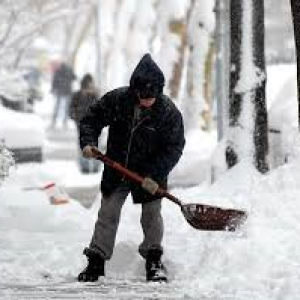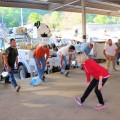
Posted: Wednesday, February 10, 2016 5:30 am
Men love to shovel snow, or so it seems to me. I am speaking generally and I could be wrong — but perhaps it is a testosterone-driven innate response for men. Nothing in me wants to go out in the cold and shovel snow. Skiing, snowboarding, walking or running in the snow, maybe, but not shoveling. I am thankful that men like to shovel the snow and keep the rest of us safe. So I wanted to write this to keep our men safe and, of course, you women out there too!!
Shoveling snow can be more strenuous than exercising full throttle on a treadmill. This is absolutely no problem — as a matter of fact, I would highly recommend this for some great exercise unless you are an individual that might be at risk for a heart attack during cold, outdoor activities. The American Heart Association says that for most people, shoveling snow may not lead to any health problems. However, they warn that the risk of a heart attack during snow shoveling may increase for some — stating the combination of colder temperatures and physical exertion increases the workload on the heart. Individuals who are at risk of a heart attack during cold, outdoor activities include:
>> Those with a prior heart attacks
>> Those with known heart disease
>> Those with high blood pressure
>> Smokers
>> Sedentary individuals
Physically, what happens when you get really cold is you have constriction of the blood vessels,” said Lawrence Phillips, a cardiologist at NYU Langone Medical Center. “It decreases the blood supply you’re getting to your vital organs.” At the gym a person can step off the treadmill or lower the intensity if necessary. But shoveling snow tends to be a “goal-oriented” activity. Call it pride, stubbornness or maybe naiveté, but men especially tend to keep at it until the job is finished, said Phillips.
William Suddath, an interventional cardiologist at MedStar Washington Hospital Center, likens it to “beginning a weightlifting program in freezing temperatures without any preparation.”
Suddath has witnessed the consequences firsthand. During the epic “Snowmaggedon” that hit the Washington region in 2010, his hospital saw a wave of emergencies involving people who’d suffered heart attacks while shoveling the mountains of snow.
Follow these tips from the American Heart Association to make snow removal safer:
>> Give yourself a break. Take frequent rest breaks during shoveling so you do not overstress your heart. Pay attention to how your body feels during those breaks.
>> Don’t eat a heavy meal prior or soon after shoveling. Eating a large meal can put an extra load on your heart.
>> Use a small shovel, or consider a snow thrower. The act of lifting heavy snow can raise blood pressure acutely during the lift. It is safer to lift smaller amounts more times than to lug a few huge shovelfuls of snow. When possible, simply push the snow.
>> Learn the heart attack warning signs and listen to your body, but remember this: Even if you’re not sure it’s a heart attack — have it checked out (tell a doctor about your symptoms). Minutes matter! Fast action can save lives — maybe your own. Don’t wait more than five minutes to call 9-1-1
>> Don’t drink alcoholic beverages before or immediately after shoveling. Alcohol may increase a person’s sensation of warmth and may cause them to underestimate the extra strain their body is under in the cold.
>> Consult a doctor. If you have a medical condition, don’t exercise on a regular basis, or are middle aged or older, meet with your doctor prior to the first anticipated snowfall.
>> Be aware of the dangers of hypothermia. Heart failure causes most deaths in hypothermia. To prevent hypothermia, dress in layers of warm clothing, which traps air between layers forming a protective insulation. Cover your head and neck as 50 percent of body heat is lost there.
Prepare yourself for this strenuous activity by beginning an exercise program.
See you in the gym!
Linda Stollings is a wellness consultant in Bristol, Tenn. Email her at lstollings@fitprescriptions.com.






